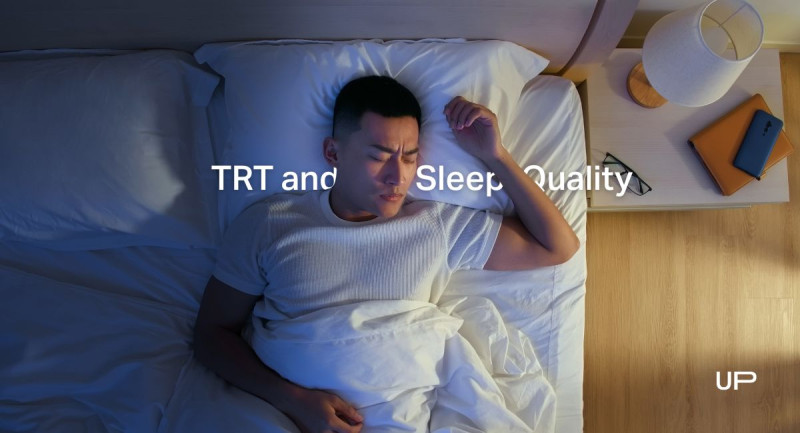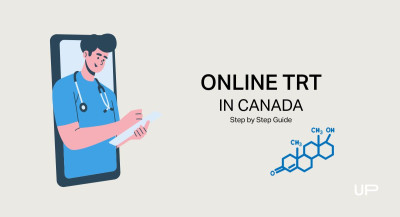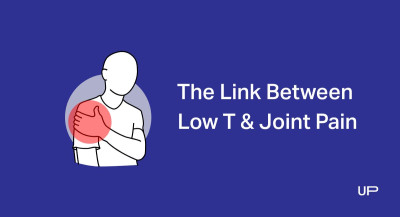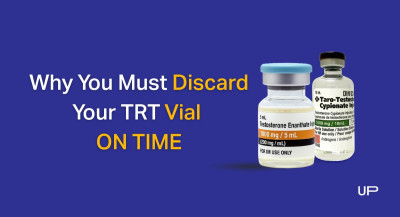TRT And Sleep Quality: Understanding The Insomnia Link


Sleep and testosterone have one of the most important yet often overlooked relationships in men’s health.

Deep, restorative sleep is when the body produces most of its natural testosterone, and when that sleep is disrupted, hormone levels can decline over time.
Many men in Canada who begin testosterone replacement therapy (TRT) notice changes in their sleep patterns, such as falling asleep faster, waking less often, or sometimes experiencing new sleep challenges as their body adjusts.
Understanding how TRT interacts with sleep cycles helps patients and healthcare providers in Canada find the right balance so that hormone therapy supports recovery, energy, and long-term well-being instead of interfering with rest.
Topics covered in this article:
- Key Takeaways (1-Minute Summary)
- The Science Behind Testosterone and Sleep
- Can TRT Improve Sleep Quality?
- TRT, Cortisol, and Circadian Rhythm
- Lifestyle Factors That Influence Sleep on TRT
- Canadian Perspective: How Monitoring Supports Safer Sleep Outcomes
- Frequently Asked Questions
- Conclusion
- References
Key Takeaways (1-Minute Summary)
- TRT can both improve and disrupt sleep, depending on hormone balance, dosing, and individual health factors.
- Low testosterone is linked to poor sleep quality, reduced REM cycles, and increased nighttime awakenings.

- Restoring testosterone to normal levels often improves mood, energy, and overall sleep quality for men with clinical deficiency.
- Some men experience temporary insomnia when starting TRT, especially if dosing is too high or taken late in the day.
- Regular monitoring and lifestyle adjustments help ensure that testosterone replacement therapy in Canada supports healthy, restorative sleep over time.
The Science Behind Testosterone and Sleep
Sleep is not just rest; it’s a critical window for hormone production, especially for testosterone. Research shows that your body uses time asleep, particularly deep sleep and the first REM phases, to ramp up testosterone output. When sleep is disrupted or cut short, testosterone levels drop, and the quality of rest suffers.
Here’s how it works:
- Testosterone begins to rise soon after sleep onset and peaks around the first REM episode of the night.
- A study of healthy young men found that restricting sleep to five hours per night for one week led to a 10–15% reduction in daytime testosterone levels—roughly the equivalent of aging 10-15 years hormonally.
- Men with shorter total sleep duration or fragmented sleep show lower testosterone levels compared to those with solid, uninterrupted sleep—especially in older age groups.
- Low testosterone is linked with lighter sleep, more awakenings during the night, and less time spent in deep and REM sleep—the stages most important for recovery and hormone production.
The takeaway? When sleep is poor, the body’s natural rhythm of testosterone production is disrupted, which can lead to lower hormone levels and a vicious cycle of poor sleep and hormonal imbalance. For men in Canada using testosterone replacement therapy (TRT), knowing this connection means addressing sleep health is almost as important as the therapy itself.
Can TRT Improve Sleep Quality?
For many men with confirmed low testosterone, restoring levels can help sleep feel deeper and more consistent. The effect is not universal, and dose, timing, and underlying conditions matter. Below is what the evidence shows.

Potential Sleep Improvements
- Low testosterone is linked with lighter sleep, more awakenings, and reduced REM. Treating deficiency can improve overall sleep quality in appropriately selected men.
- Testosterone production normally rises during sleep and peaks around early REM. When sleep improves, daytime testosterone is higher, which can create a positive cycle for mood and energy.
- Short sleep clearly lowers testosterone in healthy men, so addressing sleep hygiene alongside therapy supports better hormonal balance.
When Sleep Can Worsen Or Insomnia Appears
- High or rapidly escalated doses can fragment sleep and worsen breathing during sleep in some men. This has been shown with supraphysiologic dosing in research settings.
- Obstructive sleep apnea can coexist with low testosterone. Some guidelines advise caution or treatment of apnea before or alongside TRT because apnea can worsen if unrecognized.
- Individual response varies. Some men feel wired or restless if injections produce large peaks. Levelling out the dose or switching route can help. Guidance documents recommend individualized dosing with ongoing monitoring.
Practical Tips To Support Better Sleep On TRT
- Keep testosterone in the physiologic range and adjust the dose if you notice new sleep problems. Follow guideline monitoring of hematocrit and symptoms.
- Screen for snoring, witnessed apneas, and daytime sleepiness. If present, discuss a sleep study. Canadian guidance provides pathways for assessment and management.
- Pair therapy with sleep basics. Aim for consistent bedtimes, morning light, and regular activity. Even modest sleep restriction reduces testosterone, so protecting sleep matters.
Bottom line: TRT can improve sleep for men with true deficiency, especially when dosing is personalized and sleep disorders are addressed. If insomnia or snoring worsens after starting therapy, speak with your provider about dose timing, route, or screening for sleep apnea, which is a standard part of safe care in Canada.
TRT, Cortisol, and Circadian Rhythm
Testosterone and cortisol work like partners in a daily rhythm. Cortisol peaks in the morning to wake you up, while testosterone naturally rises during sleep and early morning hours to support recovery and energy for the day. When this rhythm is disrupted, both hormones can fall out of sync, which may explain why some men on TRT notice sleep changes or early-morning restlessness.
How Hormones Interact During Sleep
- Testosterone production increases during deep and REM sleep and peaks around dawn, aligning with the body’s circadian rhythm.
- Cortisol begins to rise toward morning to help with alertness. If cortisol stays high at night due to stress, late caffeine, or irregular dosing, it can reduce REM sleep and blunt testosterone benefits.
- TRT can help restore balance by maintaining consistent testosterone levels, which supports healthier sleep patterns when paired with good sleep habits.
When Rhythm Disrupts Sleep
- Taking injections or gels late in the day can interfere with natural hormone timing and increase alertness at night.
- Elevated evening cortisol, often from stress or inconsistent sleep schedules, may reduce TRT’s positive effects on sleep quality.
- Men who experience insomnia early in treatment sometimes improve once dosing times are adjusted and cortisol levels stabilize.
Optimizing Your Routine
- Take TRT in the morning whenever possible to match natural hormone patterns.
- Keep a consistent sleep schedule and limit evening stimulants to help cortisol fall naturally at night.
- Include regular exercise and daylight exposure, both of which help reset the circadian clock.
Bottom line: Testosterone and cortisol work best when they follow a healthy daily rhythm. By timing TRT correctly, managing stress, and protecting sleep habits, most men in Canada can experience better rest and stronger hormonal balance over time.

Lifestyle Factors That Influence Sleep on TRT
While testosterone replacement therapy (TRT) can improve sleep quality for many men, daily habits play a major role in determining how well those benefits last. Hormone balance works best when supported by good sleep hygiene, physical activity, and healthy routines. Even small changes can make a noticeable difference.
Exercise and Physical Activity
- Regular movement supports better sleep and increases natural testosterone production.
- Morning or early afternoon workouts are ideal because late-night training can raise cortisol and make it harder to fall asleep.
- Strength training and resistance exercises are especially helpful for maintaining hormone balance and improving energy levels.
Diet and Nutrition
- A balanced diet that includes protein, healthy fats, and magnesium-rich foods supports hormone stability and better sleep.
- Limiting heavy meals and alcohol close to bedtime reduces nighttime awakenings.
- Caffeine should be avoided after mid-afternoon to prevent delayed sleep onset.
Sleep Environment
- Keep the bedroom cool, dark, and quiet to encourage deep sleep.
- Turn off screens and blue-light exposure at least one hour before bed.
- Try to keep the same bedtime and wake-up time every day to strengthen your circadian rhythm.
Timing Your TRT Dose
- Taking TRT in the morning helps align hormone release with the body’s natural testosterone peak.
- Avoid applying gels or taking injections right before bed since this can sometimes increase alertness or restlessness.
- Talk to your provider if you suspect your dosing schedule is affecting sleep.
Stress and Recovery
- Chronic stress raises cortisol and can undo many of TRT’s benefits for sleep.
- Relaxation routines such as light stretching, meditation, or slow breathing before bed can help regulate cortisol and support deeper sleep.
Canadian Perspective: How Monitoring Supports Safer Sleep Outcomes
In Canada, testosterone replacement therapy (TRT) is always prescribed under medical supervision, which includes structured follow-up care. This ongoing monitoring helps ensure that treatment improves overall health, including sleep quality, without introducing unnecessary risks. Regular check-ins allow providers to identify early signs of insomnia, restlessness, or sleep apnea and make quick adjustments before problems develop.

How Monitoring Works in Canada
- Baseline assessment: Before starting TRT, doctors review hormone levels, sleep patterns, and existing health concerns such as sleep apnea or hypertension.
- Follow-up lab testing: Most Canadian clinics recheck testosterone, hematocrit, and other key markers within the first 3 to 6 months, then at least once a year after stabilization.
- Sleep symptom tracking: Providers often ask about snoring, fatigue, or nighttime awakenings to make sure TRT is not interfering with sleep.
- Medication adjustments: If testosterone levels are too high or symptoms of insomnia appear, dosage or timing can be changed to restore balance.
Why This Matters
- Monitoring helps prevent sleep-related side effects, especially when using higher doses or injectable forms of testosterone.
- It ensures the treatment remains within safe physiological limits while maintaining all its intended benefits.
- Continuous oversight also allows doctors to rule out unrelated causes of poor sleep, such as stress, anxiety, or other medical conditions.
The Telehealth Advantage
For many men in Canada, telemedicine has made this process simple.
- Lab requisitions, doctor consultations, and treatment adjustments can all be managed online.
- Sleep or fatigue symptoms can be reviewed through virtual check-ins without disrupting routine care.
- This approach helps men stay consistent with both therapy and follow-up, leading to safer and more predictable outcomes.
Bottom Line
Ongoing medical monitoring is one of the biggest advantages of receiving TRT in Canada. It keeps the therapy effective, safe, and personalized while helping men maintain healthy sleep and energy levels over time.
Frequently Asked Questions
Yes, in many cases, testosterone replacement therapy (TRT) can improve sleep quality when low testosterone is the underlying cause. Restoring testosterone to healthy levels often helps men fall asleep faster and wake up feeling more rested. However, results vary depending on factors such as dosage, timing, and existing sleep conditions.
Yes, if testosterone levels rise too high or fluctuate too much, some men may experience restlessness or difficulty staying asleep. This is why regular monitoring and dosage adjustments are important. Properly supervised TRT in Canada focuses on keeping levels within a safe and balanced range.
Some men notice improvements within a few weeks, while others may take several months. Sleep quality often improves gradually as testosterone stabilizes and overall health, mood, and energy begin to recover.
Morning dosing is generally recommended because it aligns with the body’s natural testosterone rhythm. Taking injections or applying gels late in the day can sometimes interfere with relaxation and make it harder to fall asleep.
TRT does not cause sleep apnea, but it can worsen pre-existing or undiagnosed cases if not monitored. Men with snoring, daytime fatigue, or interrupted breathing during sleep should be screened before or during treatment. In Canada, sleep studies are available through both in-person and telehealth programs.
First, speak with your healthcare provider. Insomnia may be a sign that your testosterone dose is too high or timed incorrectly. Adjusting the dosage or switching to a different formulation often resolves the issue. It is important not to self-adjust your treatment without medical guidance.
Conclusion
Sleep and testosterone are deeply connected, and improving one often helps the other. For men with low testosterone, medically supervised testosterone replacement therapy (TRT) can restore balance, improve rest, and boost daily energy. However, not every sleep issue disappears automatically after starting treatment. Hormone levels, dosage timing, and lifestyle habits all play an important role in determining how well you sleep.

The key to success is proper medical guidance and ongoing monitoring. In Canada, licensed healthcare providers ensure TRT remains safe and effective by tracking hormone levels and sleep-related symptoms over time. When therapy is personalized, supported by healthy routines, and carefully supervised, most men experience better-quality sleep, more stable energy, and improved overall well-being.
For anyone considering TRT, the first step is an honest conversation with a qualified provider. The goal is not only to restore testosterone but also to help you sleep well, recover fully, and live with lasting vitality.
References
UPGUYS has strict sourcing guidelines to ensure our content is accurate and current. We rely on peer-reviewed studies, academic research institutions, and medical associations. We strive to use primary sources and refrain from using tertiary references.- The relationship between sleep disorders and testosterone in men, PubMed,
https://pmc.ncbi.nlm.nih.gov/articles/PMC3955336 - Effect of 1 week of sleep restriction on testosterone levels in young healthy men, PubMed,
https://pubmed.ncbi.nlm.nih.gov/21632481/ - The Short-Term Effects of High-Dose Testosterone on Sleep, Breathing, and Function in Older Men, JCEM,
https://academic.oup.com/jcem/article-abstract/88/8/3605/2845283 - Evaluation and Management of Testosterone Deficiency (2024), AUA,
https://www.auanet.org/guidelines-and-quality/guidelines/testosterone-deficiency-guideline - The complex relation between obstructive sleep apnoea syndrome, hypogonadism and testosterone replacement therapy, PubMed,
https://pmc.ncbi.nlm.nih.gov/articles/PMC10597633/ - Testosterone Therapy in Men With Hypogonadism: An Endocrine Society* Clinical Practice Guideline,
https://www.saedyn.es/wp-content/uploads/2024/02/Testosterone-Therapy-in-Men-With-Hypogonadism-An-Endocrine-Society-Clinical-Practice-Guideline.pdf - Obstructive Sleep Apnea: Assessment and Management in Adults, BC Guidelines,
https://www2.gov.bc.ca/assets/gov/health/practitioner-pro/bc-guidelines/doctorsbc-sleepapnea-guideline-2021-v2.pdf - Canadian Urological Association guideline on testosterone deficiency in men: Evidence-based Q&A, PubMed,
https://pubmed.ncbi.nlm.nih.gov/33661092/
This article is written for informational purposes only and does not constitute medical advice. The information provided in the articles cannot and should not replace advice from a healthcare professional. Talk to your healthcare provider about any physical or mental health concerns or the risks and benefits of any treatment or medication.





